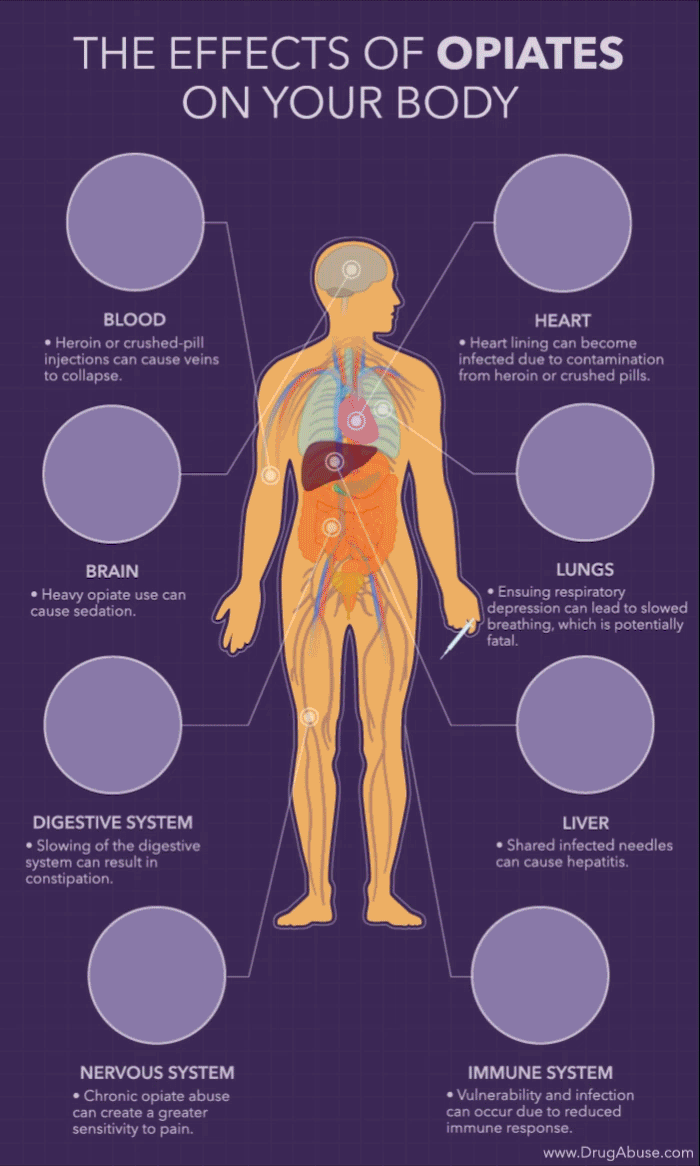 Solutions to any problem first begin with an understanding of the issue from the core.
Solutions to any problem first begin with an understanding of the issue from the core.
The growing problem of opioid and heroin addiction in McHenry County, Lake County and across the country is one we all need to understand and take seriously. If you are a friend or parent of someone who is struggling with heroin addiction as well as legal ramifications, we are here to assist full circle with expert legal representation, resources for treatment and – as seen below – knowledge to help better understand this drug and addiction.
It is important to understand exactly what happens to the human body when opiates are taken. As seen in “The Effects of Opiates on your Body” infographic, many vital parts of the body are being effected and damaged. Opioids attach themselves to proteins of a specific nature which are referred to as opioid receptors. These are found in areas of the body including but not limited to the spinal cord, gastrointestinal tract and the brain. What happens to these parts of the body once opioids are attached to the receptors are as follows:
Blood – Heroin or crushed-pill injections can cause veins to collapse. Repeated irritation or injury to the veins can temporarily block the vein swells internal lining. Partial recovery may occur to swollen or damaged veins, but when a vein collapses, it never recovers. Instead, the body tries to find another route through deeper, smaller veins in the system in order to get the blood back to the lungs and heart.
Brain – Heavy opiate use can cause sedation. Heroin is synthesized from morphine and once it enters the brain, it returns back to morphine which as stated above, binds to the opioid receptors. The receptors mostly effected are the perception of reward and pain. Because heroin suppresses breathing, it makes it harder for oxygen to get to the brain which can lead to coma, permanent brain damage or death.
Digestive System – Slowing of the digestive system can result in constipation. While this may seem like a problem that is not quite severe, the digestive complications can be long-term even in recovering addicts causing stomach cramps so severe that they require medical attention.
Heart – Heart lining can become infected due to contamination from heroin or crushed pills. Blood pressure significantly drops in a heroin overdose which can ultimately cause the heart to fail. Other heart problems caused by heroin include arrhythmia, which is an abnormal or irregular heartbeat.
Lungs – Ensuing respiratory depression can lead to slowed breathing, which is potentially fatal. Heroin addicts can develop what is called pulmonary edema. This is a condition that is life-threatening as it is what happens when fluid enters the lungs. Every time the body is exposed to heroin, more fluid will get caught in the lungs. When an addict coughs up blood, this is the sign of pulmonary edema.
Liver – Shared infected needles can cause hepatitis, which is the inflammation and swelling of the liver. While heroin addicts can get hepatitis through infected needles, they can still receive it through other means of ingestion like the nasal cavity. The most common form of hepatitis for heroin addicts is Hepatitis B.
Please contact us today for more information on legal representation and resources to help you or someone you know.
